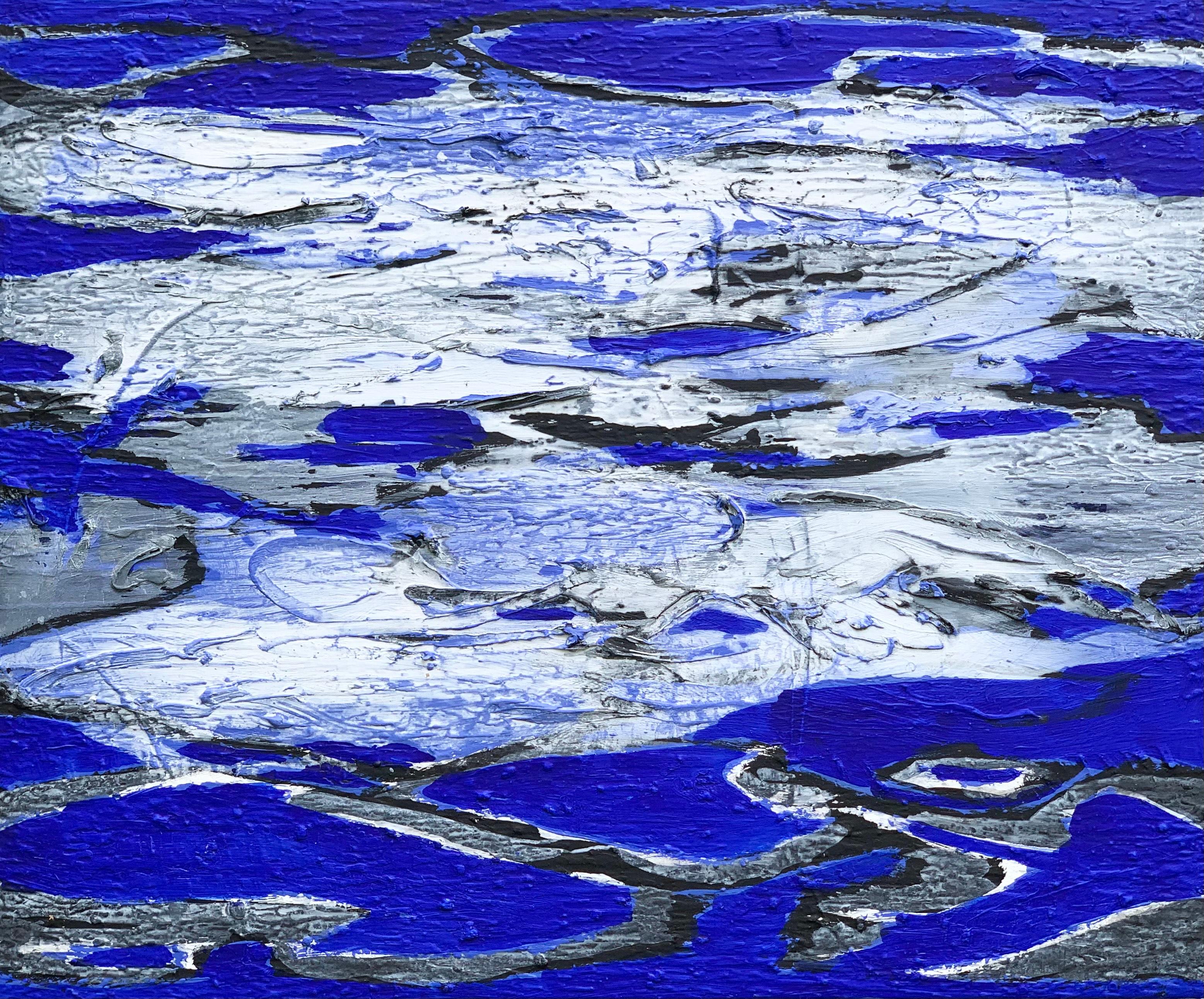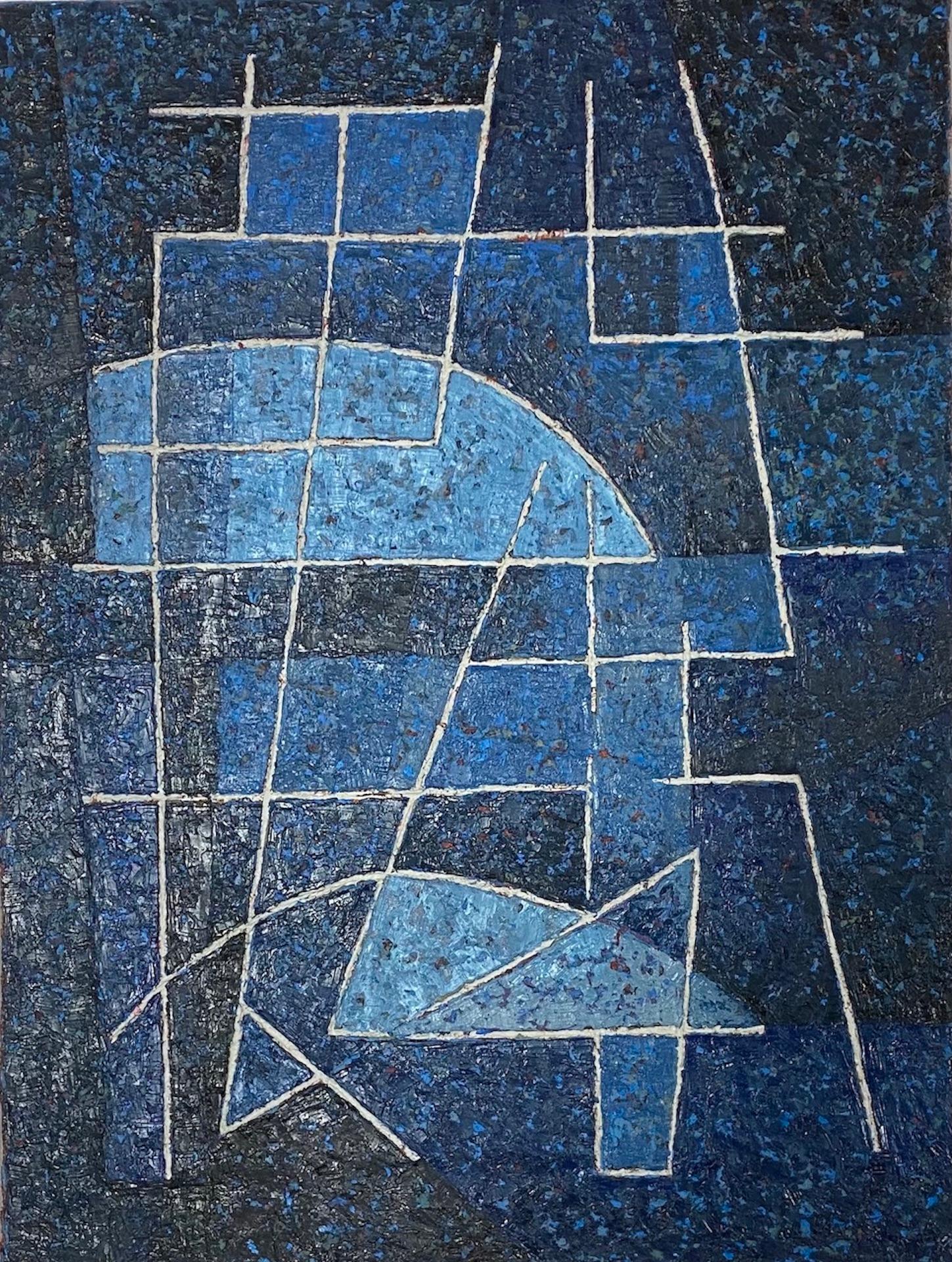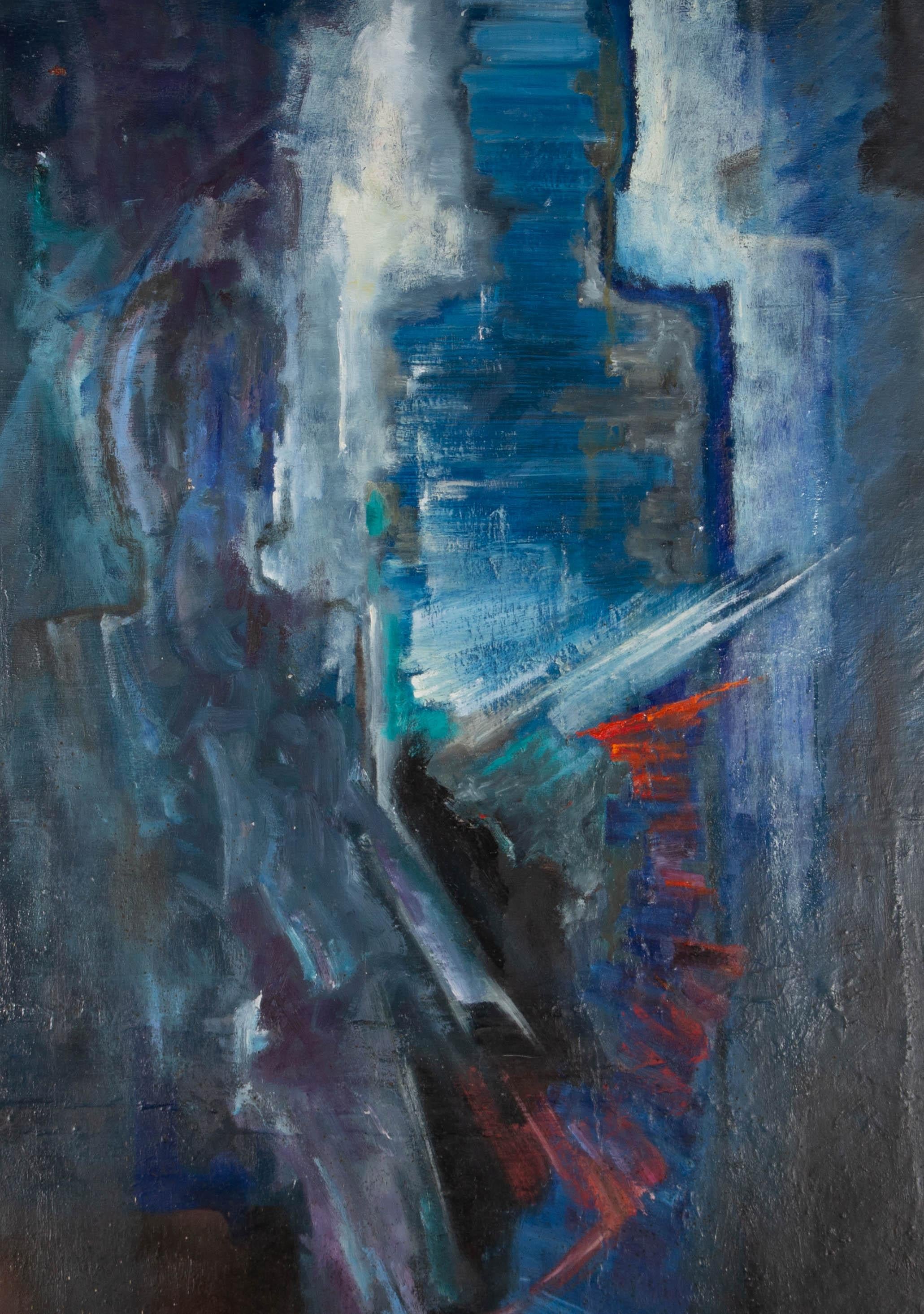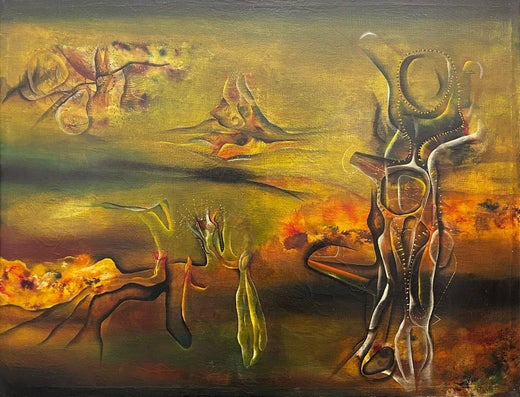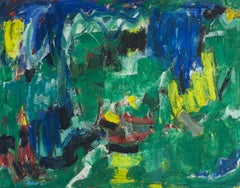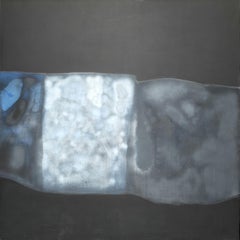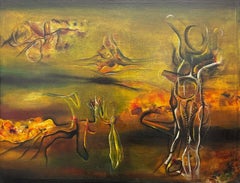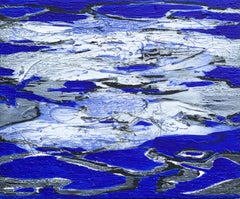Items Similar to "Blue Fossil" Gerome Kamrowski, Abstract Surrealist, Biomorphic Expressionism
Want more images or videos?
Request additional images or videos from the seller
1 of 7
Gerome Kamrowski"Blue Fossil" Gerome Kamrowski, Abstract Surrealist, Biomorphic Expressionism1960
1960
$9,600
$12,00020% Off
£7,474.24
£9,342.8020% Off
€8,500.37
€10,625.4620% Off
CA$13,809.31
CA$17,261.6420% Off
A$15,171.99
A$18,964.9920% Off
CHF 7,928.97
CHF 9,911.2220% Off
MX$180,938.53
MX$226,173.1720% Off
NOK 100,402.27
NOK 125,502.8420% Off
SEK 93,533.18
SEK 116,916.4820% Off
DKK 63,518.75
DKK 79,398.4320% Off
About the Item
Gerome Kamrowski
Blue Fossil, 1960
Acrylic and styrofoam on board
17 x 46 inches
Gerome Kamrowski was born in Warren, Minnesota, on January 19, 1914. In 1932 he enrolled in the Saint Paul School of Art (now Minnesota Museum of American Art - MMAA), where he studied with Leroy Turner, and Cameron Booth. Both Turner and Booth had been students of Hans Hofmann, and were also associated with the Abstraction-Création group in Paris. It was from these peers that Kamrowski was introduced to a "kind of expressionist cubism." In 1933 Kamrowski was awarded a scholarship to the Art Students League, where he would study in New York under Hans Hofmann. Unfortunately, immigration problems had prevented Hofmann from assuming his post. Nevertheless, Kamrowski decided to remain in New York for a short time, to attend classes taught by George Grosz. After a few weeks, he returned to St. Paul, and found a position in the mural painting division of the Minnesota FAP/WPA (Works Progress Administration). In 1936 he contributed “Synthetic Cubist Style” frescoes in the Northrup Auditorium of the University of Minnesota.
In 1937 Kamrowski went to Chicago to study under László Moholy-Nagy and Alexander Archipenko at the New Bauhaus (now Illinois Institute of Technology's Institute of Design). There he was exposed to new and interesting ideas regarding the role of nature in art and the "geometric basis of natural form".
In 1938 Kamrowski received a Guggenheim fellowship to attend Hans Hofmann's summer school in Provincetown, Massachusetts. He then relocated to New York where he met William Baziotes. Together they shared a fascination in Surrealist automatic writing, and both artists explored its possibilities in their paintings. Kamrowski was particularly drawn to Surrealism's fundamental appeal of intuition over intellect. He was interested seeking a process that "binds all things together...a kind of cosmic rhythm".
Throughout the late 1930s and early 1940s while living in New York, Kamrowski became an integral part of the emerging surrealists. In 1942, the artist Roberto Matta attempted to form a group of artists to investigate new applications for Surrealist methods. He invited Kamrowski, along with William Baziotes, Jackson Pollock, Peter Busa, and Robert Motherwell to join. Like Kamrowski, the others were more interested in process than in subject matter—the foundation of Matta's art—and the group soon dissolved. But no matter how short lived the collaboration was, this group was the kernel of the open-ended movement that was referred to as abstract surrealism and would over time prove to be the beginnings of abstract expressionism.
It was during this time, the winter of 1939/1940, that an amazing collaboration was made. Kamrowski and two of his contemporaries, William Baziotes and Jackson Pollock, came together and began to paint. The description of this historic event is described as follows in "Pollock" by Ellen G. Landau: "For a number of years, Kamrowski had been involved with Surrealist image-coaxing techniques. In a letter to B.H. Friedman, Kamrowski recalled that one day he, Pollock, and Baziotes were fooling around' with quart-cans of lacquer paint. Baziotes asked if he could use some 'to show Pollock how the paint could be spun around.' He then looked around the room for something to work on, and a canvas that Kamrowski had 'been pouring paint on and was not going well' was handy, so Baziotes began to throw and drip' white paint on it. He next gave the dripping palette knife to Jackson, who with his intense concentration' started flipping the paint with abandon. ' According to Kamrowski, after all had a chance to play, Baziotes identified the spiral forms he had created as 'birds' nests, ' but Pollock refused to interpret his spots." This painting was a pivotal work, showing the transition from, and fusion of, Surrealism to Action Painting and Abstract Expressionism.
In 1947, Kamrowski was invited to the Surrealist Exhibition in Paris by Surrealist leader André Breton. Breton said of him, "Of all the young painters whose evolution I have been able to follow in New York during the last years of the war, Gerome Kamrowski is the one who has impressed me far the most by reason of the "quality" and sustained character of his research. Among all the newcomers there, he was the only one...tunneling in a new direction..."
In the 1940s Kamrowski relocated to Ann Arbor, Michigan in order to teach at the University of Michigan School of Art. It was a career that would span thirty-eight years, and would encourage countless others to push their artistic boundaries. Professor Jon Rush, at the University's School of Art and Design, stated: "As a teacher, Professor Kamrowski admonished his students to experiment and push the boundaries of their art. He urged them to be unafraid of failure and consider it a natural part of the creative process," and says "Above all, he stressed the importance of finding one's own path and that it would take hard work and dedication to achieve that. He was a natural teacher who related well to students because he himself never stopped being one."
Teaching became a second passion. Over the years, Kamrowski's energy and drive never faltered, and his style continued to evolve dynamically from the abstract intellectual exercises of the past to colorful 3-D pieces often made of glass, cement, and random found objects. He worked every day and exhibited steadily in Michigan and elsewhere. He once said, "Michigan has been good to me, don't misunderstand me, but on the other hand I have a certain amount of contempt for it."
He cited architects Antoni Gaudi and Simon Rodia as inspirations.
- Creator:Gerome Kamrowski (1914-2004, American)
- Creation Year:1960
- Dimensions:Height: 17 in (43.18 cm)Width: 46 in (116.84 cm)
- Medium:
- Movement & Style:
- Period:
- Condition:
- Gallery Location:New York, NY
- Reference Number:1stDibs: LU1841212374002
Gerome Kamrowski
Gerome Kamrowski was born in Warren, Minnesota, on January 19, 1914. In 1933 Kamrowski was awarded a scholarship to the Art Students League, where he would study in New York under Hans Hofmann. Kamrowski decided to remain in New York for a short time, to attend classes taught by George Grosz. After a few weeks, he returned to St. Paul, and found a position in the mural painting division of the Minnesota WPA. In 1937 Kamrowski went to Chicago to study under László Moholy-Nagy and Alexander Archipenko at the New Bauhaus. There he was exposed to new and interesting ideas regarding the role of nature in art and the "geometric basis of natural form". In 1938 Kamrowski received a Guggenheim fellowship to attend Hans Hofmann's summer school in Provincetown, Massachusetts. He then relocated to New York where he met William Baziotes. Together they shared a fascination in Surrealist automatic writing, and both artists explored its possibilities in their paintings. Kamrowski was particularly drawn to Surrealism's fundamental appeal of intuition over intellect. He was interested seeking a process that "binds all things together...a kind of cosmic rhythm". Throughout the late 1930s and early 1940s while living in New York, Kamrowski became an integral part of the emerging surrealists. In 1942, the artist Roberto Matta attempted to form a group of artists to investigate new applications for Surrealist methods. He invited Kamrowski, along with William Baziotes, Jackson Pollock, Peter Busa, and Robert Motherwell to join. No matter how short lived the collaboration was, this group was the kernel of the open-ended movement that was referred to as abstract surrealism and would over time prove to be the beginnings of abstract expressionism. It was during this time, the winter of 1939/1940, that an amazing collaboration was made. Kamrowski and two of his contemporaries, Baziotes and Pollock, came together and began to paint. This painting was a pivotal work, showing the transition from, and fusion of, Surrealism to Action Painting and Abstract Expressionism. In 1947, Kamrowski was invited to the Surrealist Exhibition in Paris by Surrealist leader André Breton. Breton said of him, "Of all the young painters whose evolution I have been able to follow in New York during the last years of the war, Kamrowski is the one who has impressed me far the most by reason of the "quality" and sustained character of his research." In the 1940s Kamrowski relocated to Ann Arbor, Michigan in order to teach at the University of Michigan School of Art. It was a career that would span 38 years, and would encourage countless others to push their artistic boundaries. Teaching became a second passion. Over the years, Kamrowski's energy and drive never faltered, and his style continued to evolve dynamically from the abstract intellectual exercises of the past to colorful 3D pieces often made of glass, cement, and found objects. He worked every day and exhibited steadily in Michigan and elsewhere.
About the Seller
5.0
Platinum Seller
Premium sellers with a 4.7+ rating and 24-hour response times
Established in 2022
1stDibs seller since 2022
131 sales on 1stDibs
Typical response time: <1 hour
- ShippingRetrieving quote...Shipping from: New York, NY
- Return Policy
More From This Seller
View All"Untitled, 58-26" Stephen Pace, Interlocking Forms, Blue and Black Abstract Work
By Stephen Pace
Located in New York, NY
Stephen Pace
Untitled, 58-26, 1958
Signed and dated lower left
Oil on canvas
56 x 40 inches
Born in Charleston, Missouri, Stephen Pace grew up in Indiana, where his parents operate...
Category
1950s Abstract Expressionist Abstract Paintings
Materials
Canvas, Oil
"Untitled, 62-11" Stephen Pace, Blues and Greens, Cool Tones, Abstract Painting
By Stephen Pace
Located in New York, NY
Stephen Pace
Untitled, 62-11, 1962
Signed and dated lower left
Oil on canvas
50 x 64 inches
Born in Charleston, Missouri, Stephen Pace grew up in Indiana, where his parents operate...
Category
1960s Abstract Expressionist Abstract Paintings
Materials
Canvas, Oil
"Stars Elegy II" Rudolf Baranik, Social Commentary, Blue Abstract Composition
Located in New York, NY
Rudolf Baranik
Stars Elegy II, 1975
Signed, titled and dated on stretcher bar
Oil on canvas
72 x 72 inches
Born in Lithuania, he immigrated to the United States in 1938, when his family sent him to live with a relative in Chicago. His parents were secular Jewish socialists and were killed by the Nazis during the Second World War. Baranik was well known in the art world for his political advocacy, and was one of the first artists to organize protests against the war in Vietnam. Some of his best known works are the Napalm Elegies, a series of 30 antiwar paintings created between 1967 and 1974. His art was inspired by his sense of the gross inequities around the world, and he led virtually every progressive political movement within the New York art world from the 1960s to the mid-1990s. Significant exhibitions and awards include:1981 Guggenheim Fellowship in Fine Arts, 1982 "Art Couples 1: May Stevens and Rudolf Baranik," P.S. 1, New York, NY, and 1966 Peace Tower. Baranik's art is included in many collections, including the Museum of Modern Art in New York, the Whitney Museum of American Art and the Hirshhorn Museum.
Baranik died in Eldorado, New Mexico in 1998.
The paintings of Rudolf Baranik are increasingly thought to be among the most important works of the New York School painting...
Category
1970s Abstract Abstract Paintings
Materials
Canvas, Oil
"Untitled" Gerome Kamrowski, circa 1944 American Surrealist Composition
By Gerome Kamrowski
Located in New York, NY
Gerome Kamrowski
Untitled, circa 1944
Signed lower right
Oil on canvas
35 3/4 inches x 47 3/4 inches
Gerome Kamrowski was born in Warren, Minnesota, on January 19, 1914. In 1932 he...
Category
1940s Surrealist Abstract Paintings
Materials
Canvas, Oil
"No. 4" Seymour Franks, Mid-Century Abstract Modernist Lilac, Blue Composition
By Seymour Franks
Located in New York, NY
Seymour Franks
No. 4, 1952
Signed upper left
Dated on verso
Oil on canvas
American painter and designer, Seymour Franks, was born in New York City in 1916.
Seymour Franks contracte...
Category
1950s Abstract Expressionist Abstract Paintings
Materials
Canvas, Oil
"They Do Not Sing For Me" Elise Asher, Abstracted Scene, Dark Blue and Yellow
Located in New York, NY
Elise Asher
They Do Not Sing For Me, 1987
Signed and dated lower right
Mixed media on paper
Sight 12 x 17 5/8 inches
Provenance
Private Collection, New York
Exhibited
The William B...
Category
1980s Abstract Abstract Paintings
Materials
Mixed Media
You May Also Like
Constantin Karahalios Abstract Expressionist Oil Painting Blue 1960 Mid Century
Located in Buffalo, NY
A vibrant and captivating abstract painting by Greek artist Constantin Karahalios featuring incredible texture and color. A custom frame presentation would be included in the price....
Category
1960s Abstract Expressionist Abstract Paintings
Materials
Canvas, Oil
Belgian Contemporary Art by Jean-Roch Focant - Avalement Bleu
Located in Paris, IDF
Pigments, sand glue & acrylic on wood
Category
2010s Abstract Abstract Paintings
Materials
Wood, Glue, Acrylic, Pigment
Untitled 1 - Contemporary Abstract Blue Painting, Conceptual Art
Located in Salzburg, AT
Urszula Wilk – artist statment:
I have always been interested in the idea of infiniteness of a painting and its opposite – that is the physical finiteness of the painting. This phy...
Category
2010s Contemporary Abstract Paintings
Materials
Cotton Canvas, Oil
Ultramarine Blue Abstract
By Juan Jose Garay
Located in LAS ROZAS DE MADRID, ES
Painting: Acrylic on Canvas.
Esta obra es una explosión de energía y pasión que quise capturar con colores vivos y movimientos caóticos. Utilicé acrílico y esmalte para crear una te...
Category
21st Century and Contemporary Abstract Expressionist Interior Paintings
Materials
Canvas, Acrylic
Miles Cole, Blue Composition, Original Abstract Painting, Blue Contemporary Art
By Miles Cole
Located in Deddington, GB
Blue Composition [2017]
Original
Abstract
Oil Paint on Canvas
Image size: H:61 cm x W:46 cm
Complete Size of Unframed Work: H:61 cm x W:46 cm x D:2cm
Framed Size: H:64 cm x W:50 cm x...
Category
21st Century and Contemporary Abstract Abstract Paintings
Materials
Canvas, Oil
Mircea Marosin (1921-2007) - 20th Century Oil, Abstraction in Blue
Located in Corsham, GB
Unsigned. On card.
Category
21st Century and Contemporary Abstract Paintings
Materials
Oil
More Ways To Browse
Fossil Vintage
The Young Painter
Landau Vintage
Works In Progress
Fossil Art
Vintage Letter B
Fossil Painting
Leroy Turner
Abstract Face Acrylic Painting
Korean American
48 X 72 Oil Paintings
Africa Abstract Paintings
Double Sided Oil Painting On Canvas
Lee Jackson
Red And Gold Abstract
Abstract Drip Painting
Cobalt Blue Painting
French Expressionism
